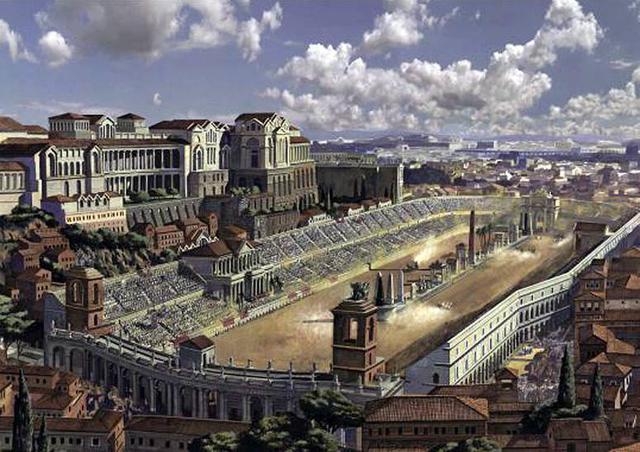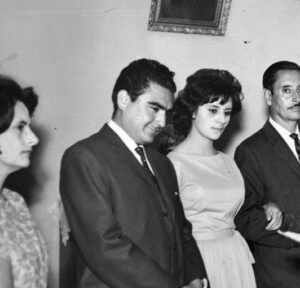The Roman Senate had had enough of Caligula–they wanted a sword run through his body. His policies and the neglect of his duty jeopardized the empire’s safety and legitimacy. In 41 BCE, deciding to take matters into his own hands, Cassius Chaerea led an assassination attempt on the most powerful person in the Mediterranean.1
Because of Cassius Chaerea’s position in the Roman government (tribune to the praetorian guard), Cassius eventually met the person he grew to hate: Caligula, the emperor of Rome. Caligula often ridiculed him, making sure everyone knew that he was effeminate. However, deciding that his public humiliation of Chaerea’s effeminacy was not enough to satisfy him, he often extended his hand to be kissed, while making obscene motions to Chaerea with his fingers. Having suffered enough public embarrassment, Chaerea craved becoming Caligula’s Grim Reaper.2
Caligula regularly tormented his subjects, his senators, and even his own family; no man or woman was safe. Caligula was known to force the wives of noble families to engage in sexual activity with him, often bragging about his debauchery. Caligula even forced husbands to divorce their wives so that he could marry them. For instance, he mandated that Memmius Regulus, an aristocrat, divorce his wife, Lollia. However, not long after this, he divorced her to marry Milonia Caesonia, the woman who gave birth to his future daughter.3 Not satisfied with the wives of aristocrats, he also spent much time in bed with his own sisters.4
His political policies, like his personal relations, were unpopular. For instance, although it was reasonable for emperors of Rome to become deified after their death–a process called apotheosis–it was almost unheard of for a sitting emperor to consider himself a god while alive. On certain occasions, he even dressed as the incarnation of the greatest of all Roman gods: Jupiter. He even established his own cult by decreeing that people worship him as the living god Jupiter Latiaris.5 His demand to be worshiped nearly incited a riot because it tempted him to build a statue of himself in a Palestinian temple.6

Caligula’s mental stability was often called into question after he became sick in October 37 CE; many believed Caligula to be mentally deranged. In fact, after his recovery from the illness, Caligula gathered a large army for the invasion of Britain. He made his soldiers gather seashells–his “spoils of war”–instead of engaging in combat; in fact, the army was commanded by Caligula to do nothing except this one thing. When returning to the Empire, Caligula arranged for a standing ovation, since he was the individual responsible for “invading” Britain.7 Caligula, before leaving the province to celebrate his “victory,” wanted to kill one-tenth of his legions on the grounds that they had nearly mutinied after the death of the first emperor Augustus in 14 CE. Much effort was made to try to stop Caligula from making such a rash move; however, he could not be stopped. He summoned the offending legions, without their weapons, to attend an assembly that was surrounded by an armored cavalry. When Caligula saw that the soldiers sensed something was wrong and slipped out of the assembly to gather their weapons, he at once fled back to Rome to verbally attack the Senate in order to divert the rumors of his wish to decimate the legions.8 Another reason why Caligula’s sanity was called into question involves how he treated people and interacted with them. Caligula once asked the actor Apelles whether he, Caligula, was greater than Jupiter. When Apelles hesitated to answer, Caligula had him scourged. While at dinner with the Consuls, he began laughing hysterically. When they politely asked him what was so funny, he said, “Why else than because a nod on my part would be enough to have either of you slaughtered at once?”9

Caligula did not know the meaning of financial restraint. When in financial hardships, due to his lavish spending, he extorted money from citizens and bureaucrats. Caligula claimed that the citizenship of certain individuals had been illegally claimed, and used this as justification to acquire their financial capital–even though official documents contradicted his claims; he also falsely accused people of intentionally manipulating census reports if they had recently added more holdings to their estates. Caligula, under one notorious case, forced Aponius Saturninus, a praetorian, to pay millions for nodding off at an auction.10
Although many were aware that Caligula had his odd behaviors, one of the reasons why it took so long for anyone to consider making a move against Caligula was that he was initially very popular with the Roman people. To make them happy and to keep their trust, he put on many games in the Circus Maximus, an arena for chariot racing; this sport, immensely popular among the Romans, helped Caligula appease the citizens.11 However, even his appeasement to his people did not last long. Over the course of Caligula’s reign, he not only made his citizens unhappy, but he also alienated himself from his Praetorian Guard. The alienation that occurred between Caligula and his guard proved to be disastrous because it was the duty of the Praetorian Guard to ensure the safety of the emperor. Caligula, losing favor with his bodyguard, made it much easier for his end to transpire.12

Many people living during the time of Caligula looked at his actions and knew that someone, eventually, was going to replace him as the emperor. People took the natural disasters that occurred as signs that something horrible was going to happen to him. For instance, lightning struck the Capitol in Capua, and, on the same day, lightning also struck the Palatine Hill. The first event was interpreted as the foretelling of danger surrounding the emperor, while the second sign signaled the death of a wealthy, powerful man. When Caligula was trying to ascertain his future by meeting with Sulla, an astrologer, Sulla told Caligula that his death was inevitable. Caligula, believing that his life was going to end soon, became nervous and put anyone to death that he perceived as a threat; Caligula’s paranoia almost allowed him to avoid fate. When the oracle of Antium warned Caligula of Cassius, Caligula had Cassius executed. However, Cassius Chaerea was not the man that was killed; it was Cassius Longinus, the proconsul of Asia. Had Caligula remembered that he routinely humiliated Cassius Chaerea, the future of Rome might have been much different. Caligula’s extreme caution of those around him caused much tension with the Senate and eventually contributed to his demise.13
During Caligula’s reign, plans for his replacement were considered; however, they were postponed because the opportunity had yet presented itself. Caligula had been destructive long enough, and a plan to assassinate Caligula was forming. As this plan was underway, the conspirators had to be careful around Caligula; they feared that they were the targets of Caligula’s suspicion. Caligula, discovering a plot against his life, quickly executed Letelus Gaetullicus and M. Aemilius Lepidus, the leaders of the conspiracy.14 He began appearing more suspicious and cynical of the Senate, prompting him to reinstate treason trials, causing him to have members of the Senate murdered and exiled.15 During his reign of terror, he executed even his own supporters, and abused many citizens.16

On January 24, the day that Cassius relieved Rome of Caligula’s tyranny, Caligula almost unknowingly foiled Cassius’ plans. Caligula, having an upset stomach, due to the food he ate the previous day, was not sure whether he should rise and leave his residence. Realizing that the plan was doomed to fail if Caligula did not leave, Caligula’s “friends,” being able to think quickly, were finally able to convince him to leave.17
Cassius knew that his moment had come as soon as he saw Caligula arriving at the theater.18 The accounts of Caligula’s death vary here. One account contends that Cassius’ subordinates made the centurions that were aware of the assassination plot disperse the crowd so that no one could intervene in Caligula’s death. While Caligula was conversing with Sabinus, Chaerea spoke to Caligula in order to grab his attention; when Caligula turned to address Chaerea, his face was met with Chaerea’s fist, splitting his jaw. While on the ground, he called out to everyone, saying that he was alive. As he flailed on the ground and cried out, the others finished what Cassius started, leaving thirty wounds in Caligula’s body.19
The other account of the story says that, while Caligula was addressing a crowd of people, Chaerea cut deeply into Caligula’s neck, yelling, “Take this!”20 Despite what has occurred, the other conspirators soon joined Cassius to make sure that Caligula was indeed dead.21 Making sure that no heir of Caligula ever ruled the empire again, his wife and child were both killed.22
Even though Cassius liberated Rome from an evil man, the Roman empire still targeted Cassius for execution. Cassius most likely knew that this was going to be the outcome, but his desire for revenge drove him to kill the tyrannical ruler. Cassius’ only reward for removing an evil dictator was, unfortunately, nothing less than death.23 The end of Caligula and his reign sparked a new era of Roman life: one without a tyrant.
- Chambers Biographical Dictionary, 2011, s.v. “Claudius I,” by Liam Rodger and Joan Bakewell. ↵
- Suetonius, The Twelve Caesars, ed. Thomas Forester (Auckland, N.Z.: EBSCOhost, 2009), 456-457. ↵
- Who’s Who in the Roman World, Routledge, 2001, s.v. “Caligula,” by John Hazel. ↵
- Richard Cavendish, “Birth of the Emperor Caligula,” History Today 62, no. 8 (2012): 8. ↵
- Who’s Who in the Roman World, Routledge, 2001, s.v. “Caligula,” by John Hazel. ↵
- The Columbia Encyclopedia, 2018, s.v. “Caligula,” by Paul Lagasse. ↵
- Who’s Who in the Roman World, Routledge, 2001, s.v. “Caligula,” by John Hazel. ↵
- Suetonius, Lives of the Caesars, trans. Catharine Edwards (Oxford: OUP Oxford, 2008), 161. ↵
- Suetonius, Lives of the Caesars, trans. Catharine Edwards (Oxford: OUP Oxford, 2008), 136-168. ↵
- Suetonius, Lives of the Caesars, trans. Catharine Edwards (Oxford: OUP Oxford, 2008), 157. ↵
- Richard Cavendish, “Birth of the Emperor Caligula,” History Today 62, no. 8 (2012): 8. ↵
- Richard Cavendish, “Birth of the Emperor Caligula,” History Today 62, no. 8 (2012): 8. ↵
- Suetonius, Lives of the Caesars, trans. Catharine Edwards (Oxford: OUP Oxford, 2008), 165-166. ↵
- Who’s Who in the Roman World, Routledge, 2001, s.v. “Caligula,” by John Hazel. ↵
- Richard Cavendish, “Birth of the Emperor Caligula,” History Today 62, no. 8 (2012): 8. ↵
- Britannica Concise Encyclopedia, 2017, s.v. “Caligula.” ↵
- Suetonius, The Twelve Caesars, ed. Thomas Forester (Auckland, N.Z.: EBSCOhost, 2009), 458-459. ↵
- Suetonius, The Twelve Caesars, ed. Thomas Forester (Auckland, N.Z.: EBSCOhost, 2009), 458. ↵
- Suetonius, Lives of the Caesars, trans. Catharine Edwards (Oxford: OUP Oxford, 2008), 166-167. ↵
- Suetonius, Lives of the Caesars, trans. Catharine Edwards (Oxford: OUP Oxford, 2008), 166. ↵
- Suetonius, The Twelve Caesars, ed. Thomas Forester (Auckland, N.Z.: EBSCOhost, 2009), 458-459. ↵
- Suetonius, Lives of the Caesars, trans. Catharine Edwards (Oxford: OUP Oxford, 2008), 167. ↵
- Who’s Who in The Roman World, Routledge, 2001, s.v. “Chaerea, Gaius Cassius,” by John Hazel. ↵



27 comments
Christian Anthony
This article showed very clearly what one does when the wrong person has too much power. Being power hungry and apathetic to ones actions leads to what Caligula did. Such evil actions could be attributed to his abuse of power and inflated ego, making him think he had a right to do whatever he wanted. How such a man ever existed is beyond me but in the end he got what he deserved with others finishing what the assassination’s attempt failed to do.
Ian Mcewen
madness is something that fascinates me due to it functionally changing their perception of those with it, how they see the world, the common things that are outrageous. while they are interesting to learn about if they are in a position of power it can often lead to disaster because their orders are incredibly stupid and can destroy the dedicate balance of the governments systems.
Emmett Pena
Caligula was the worst of the emperors during this era of Roman civilization. He had no remorse for those who did not like him and did not accept any sort of disproval of his doings. He did whatever he wanted whenever he felt like it. His tyrannical behavior is why so many people wanted him dead and this article brilliantly shows in great detail the type of sinful deeds Caligula did against the people of Rome.
Madeline Emke
This article discusses a fairly infamous emperor of Rome, Caligula, but focuses on his tyranny and his assassination. This focus allows readers to get insight into how detrimental Caligula’s rule was for Rome. There were numerous murders, attempted murders, and bizarre political rulings during his reign. This author looked in-depth at Caligula’s rule and provided a brief, yet succinct summary of the hardships faced by his citizens which led to his downfall in popularity and his eventual assassination.
Margaret Cavazos
I had never heard of Caligula, and after reading this article, I am astonished that such a man existed. This man may have been out of his mind, or so drunk with power that he could not function. This article listed several grievances against him, each more horrifying and unbelievable than the next. Caligula seems to have all the evil characteristics of a villain, and the only positive thing I could see was his ability to host events that the public enjoyed, and that was only towards the beginning of his reign. It is easy to believe that he may have lost his mind, given the extent of actions, however, it is also possible that he did this in his right mind. While this is a terrifying possibility, it is a clear example of why people should not be given this amount of power, it is difficult to handle, and leads to atrocities.
D'Hannah Duran
Caligula was a power hungry tyrant, but there were also many other that were power hungry. It is terrible to think about hope he treated people and how many died during his reign. This was an amazing and informative article that i enjoyed reading.
Julia Edwin-Jeyakumar
Dang, didn’t Sulla do the same thing? But he probably thought he was a God from the way he had control over everything. From sleeping with his sisters to ordering his soldiers to pick up seashells. I mean if anyone did rage war against him, I would think the roman empire would be demolished and history would end there. I am honestly surprised how someone didn’t kill him sooner, I wonder what the death toll was when he started to kill everyone for despicable reasons. Anyway, it seemed that it took a lot of toll on him and he didn’t seem to live a happy life.
Amelia Hew
It’s sickening on how Caligula treated his people and supporters and it got worse when he was told that his death was inevitable, causing to execute anyone he deemed a threat. He was also an egotistical person and has the audacity of ordering his people to worship him as a living god, despite committing several crimes and sins. It’s no surprise that he was assassinated by his people, in fact it’s a miracle that he was able to live that long due to his power and status.
Aaron Peters
What an interesting and entertaining read! I vaguely knew who Caligula was, but I had no idea just how brutal and insane his reign over the Roman Empire was. I found the part about him ordering his men to collect seashells on the shores of Britain. That aside, I’m surprised at his brutality towards his own citizens and colleagues in the Senate, I suppose at that point, Cassius Chaerea had no other options but to dispose of Caligula.
Kenneth Gilley
What an interesting article! I knew that Caligula was one of Rome’s worst emperors, but I had no idea how bad he really was. He really did cause his own demise. When he saw the effect his actions were having on public opinion, instead doing better, he increased his brutality. Also, even though he was literally the most powerful person in the world at the time, he was probably miserable. After all, he was hated by so many, and he was constantly facing plots against him.